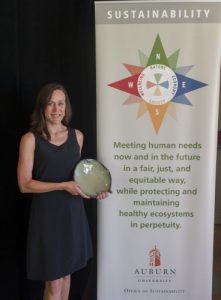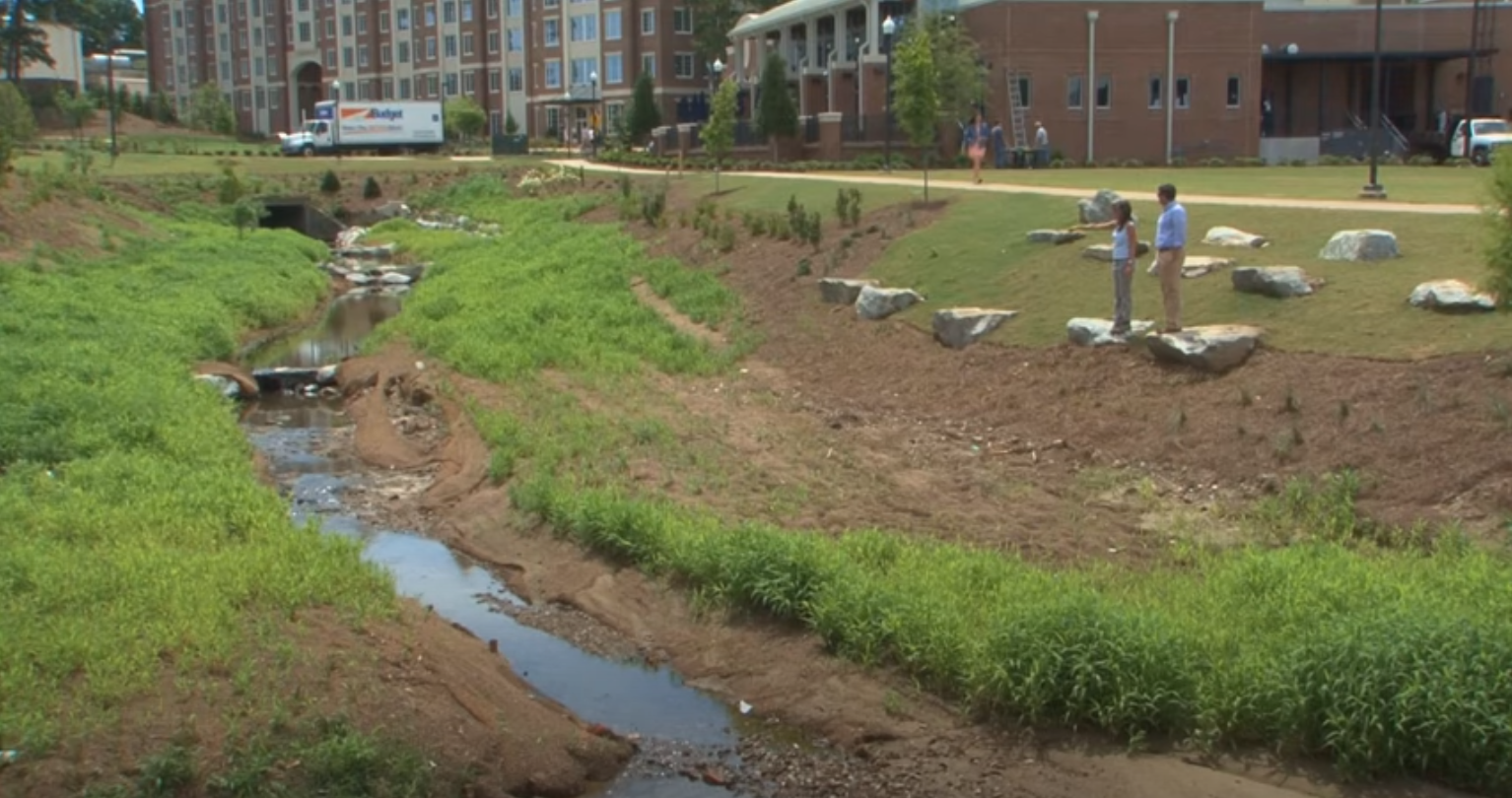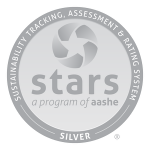Auburn University recognizes the benefits associated with more sustainable water management practices. We have surpassed our goal to decrease water use intensity by 2020, but we continue to monitor and reduce water consumption, as well as manage stormwater. Water is crucial to our lives, which motivates us to implement practices to reduce environmental impacts, promote personal well-being, and cut costs on campus.
Water
| Practices
SPOTLIGHTS
Profile
Profile
Dr. Eve Brantley combines passion and commitment for responsible environmental stewardship with joyful energy and a deep faith in people. As a result, Eve is exceptionally effective at engaging and empowering all kinds of people to make a real difference on behalf of human communities and the natural world.
Eve’s passion is watersheds and water quality, where she applies the ethics, principles, and practices of sustainability to responsible stewardship and use of the natural world. She uses nature as a model for managing and treating stormwater, restores streams based on understanding of natural stream structure and function, teaches innovative approaches to development that reduce or eliminate negative impacts, and informs watershed management planning with meaningful public participation.
Project
The restoration of a section of Parkerson Mill Creek brings to life innovative ways to manage streams for habitat and water quality improvements. Located in the heart of campus, the full of life stream offers a new, beautiful ecological system for those passing by, and provides a place for students and faculty to stop by the outdoor classroom for a lesson.
Points of Performance
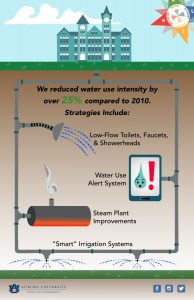 Help us spread the facts on sustainable water practices at Auburn by downloading and sharing our poster, and then spend some time learning the details about some of the people and projects that have helped create our success.
Help us spread the facts on sustainable water practices at Auburn by downloading and sharing our poster, and then spend some time learning the details about some of the people and projects that have helped create our success.
Charlene LeBleu
Dan Ballard
Donald E. Davis Arboretum
Energy Management Group
Michael Freeman
Michael Hein
2016 REPORT CARD
The water credits in AASHE STARS “seek to recognize institutions that are conserving water, making efforts to protect water quality and treating water as a resource rather than a waste product.” Water conservation and effective rainwater and wastewater management reduce energy use and greenhouse gas emissions and ultimately improve the health of local water ecosystems.
Below you can find out more about the specifics of Auburn’s performance in each of the credit areas, as well as how our efforts compare to those of other doctoral institutions who have also completed the STARS 2.0 assessment. *
OP-26: Water Use 2.69/3.00
This credit recognizes institutions that have reduced water use. By reducing campus water withdrawals, institutions can reduce pressures on local aquifers, streams, rivers, lakes, and aquatic wildlife.
OP-27: Rainwater Management 2.00/2.00
This credit recognizes institutions that implement policies and programs to reduce stormwater runoff and resultant water pollution, and treat rainwater as a resource rather than as a waste product. By using low impact development practices and green infrastructure to manage rainwater, institutions can help replenish natural aquifers, reduce erosion impacts, decrease pressures on public infrastructure and minimize local water contamination.
OP-28: Wastewater Management 0.00/1.00
This credit recognizes institutions that are catalyzing and supporting ecologically preferable methods of wastewater management and treatment. Natural wastewater systems minimize the use of chemicals and require little energy to operate. By naturally handling wastewater, institutions can work with nature and their local communities to decrease pressures on sewer infrastructure, enhance the environment (e.g. through wetlands creation), and minimize contamination of water bodies.
Collectively these efforts place us at the top of the 3rd quartile, when compared to other doctoral institutions that have completed the STARS 2.0 assessment.

* Language adapted from the official STARS 2.0 Technical Manual.
2016 PRACTICES IN PLACE
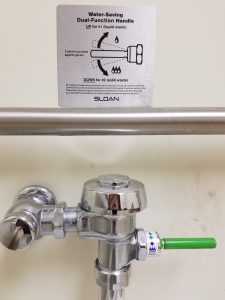
Dual-flush toilets lower water usage on campus.
At the time of our STARS submission, some of the water management practices on campus included:
Aclara Alert System for Water Usage
Adopt a Spot
Building-Level Water Metering
Donald E. Davis Arboretum
Low-Flow Fixtures
Native Species Landscaping
Smart Irrigation Systems
Parkerson Mill Creek Restoration Plan
Stormwater Management Plan
Water Reduction Goals
KEY PARTNERS AND PLANS
The successes in water management at Auburn wouldn’t be possible without the foresight and determination of many units across campus and in the community. We hope you’ll choose to learn more about these important partners and the services and programs they offer the Auburn Family.
College of Engineering — Biosystems Engineering
Department of Risk Management and Safety — Environmental Program
Facilities Management- Campus Planning & Space Management
Facilities Management — Landscaping
Facilities Management — Utilities & Energy
The great work of these units is guided in part by Auburn’s Stormwater Management Plan, Parkerson Mill Creek Restoration Plan, and our Climate Action Plan.
GET INVOLVED
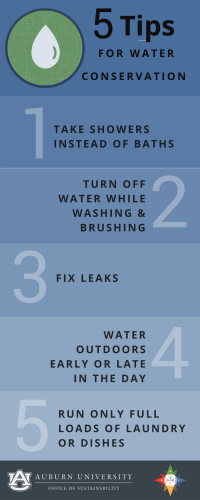 Choosing more sustainable options for your own water usage can serve as a great start to making a difference, but you can also help improve our world by joining with others to work on these challenges at a larger scale. Consider connecting with one of the following groups or academic units to meet others interested in working on these issues, too.
Choosing more sustainable options for your own water usage can serve as a great start to making a difference, but you can also help improve our world by joining with others to work on these challenges at a larger scale. Consider connecting with one of the following groups or academic units to meet others interested in working on these issues, too.
Organizations
American Society of Agriculture and Biological Engineers
Degree Options
Natural Resources Management Degree
2016 STARS Report Score


